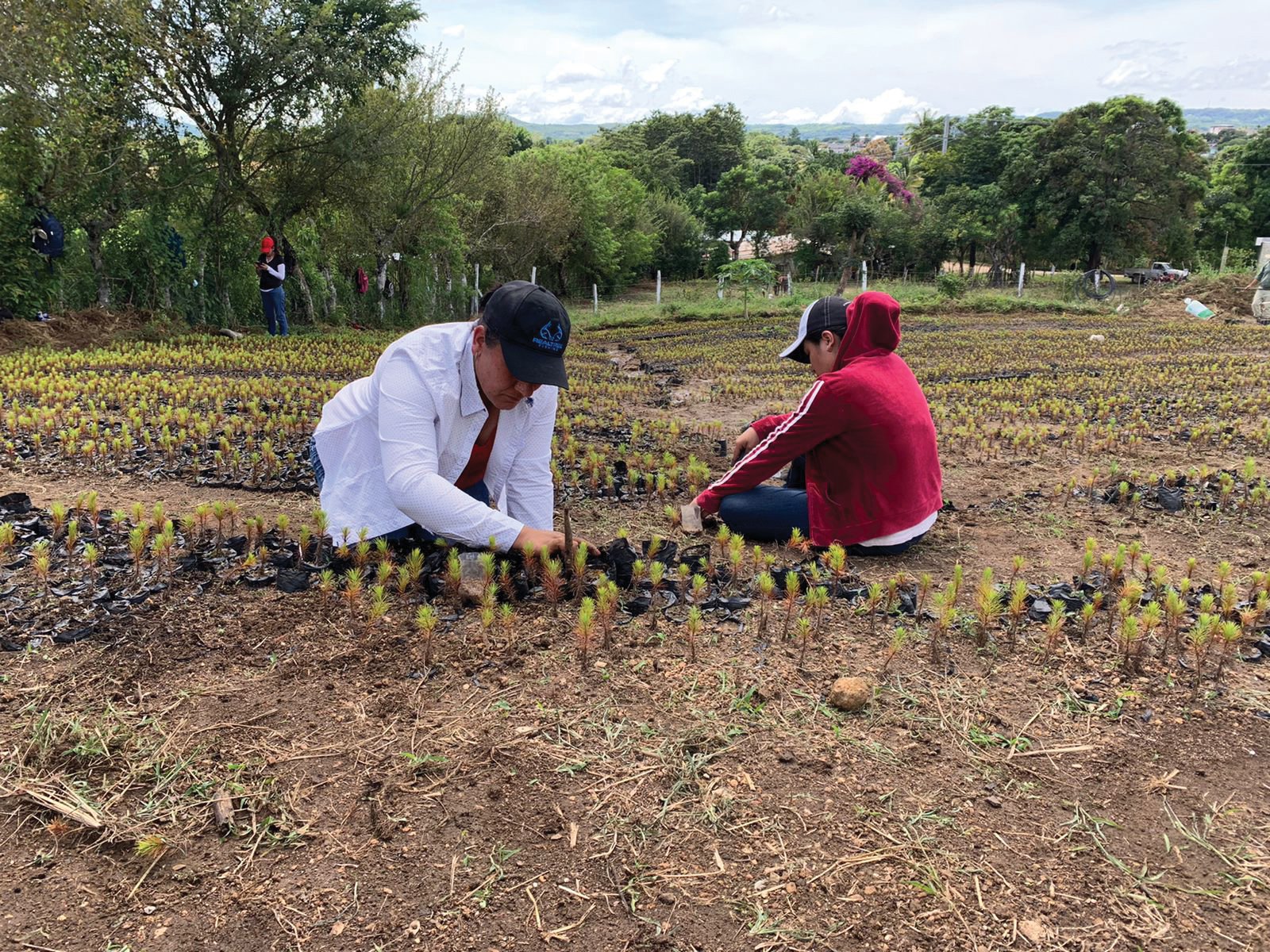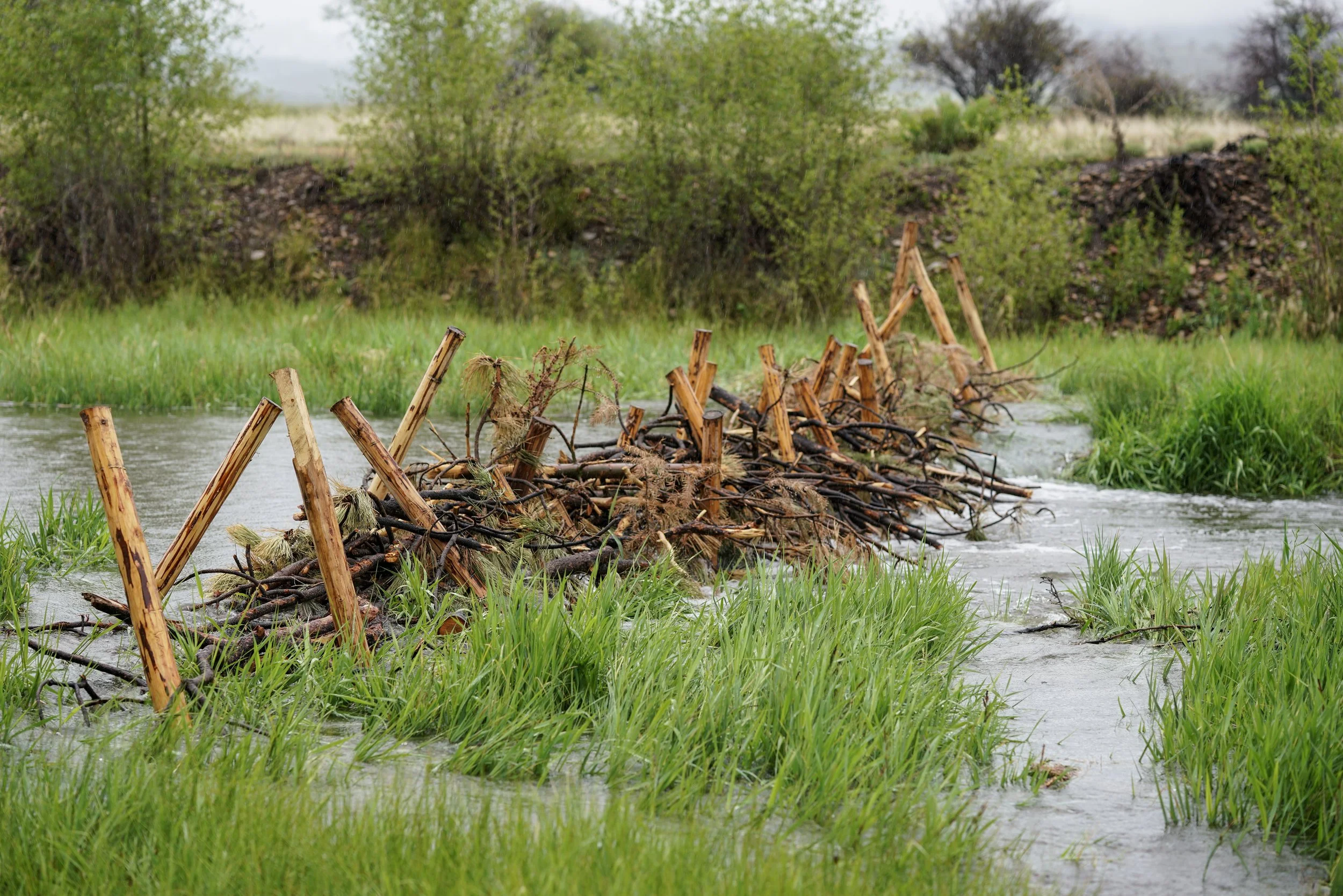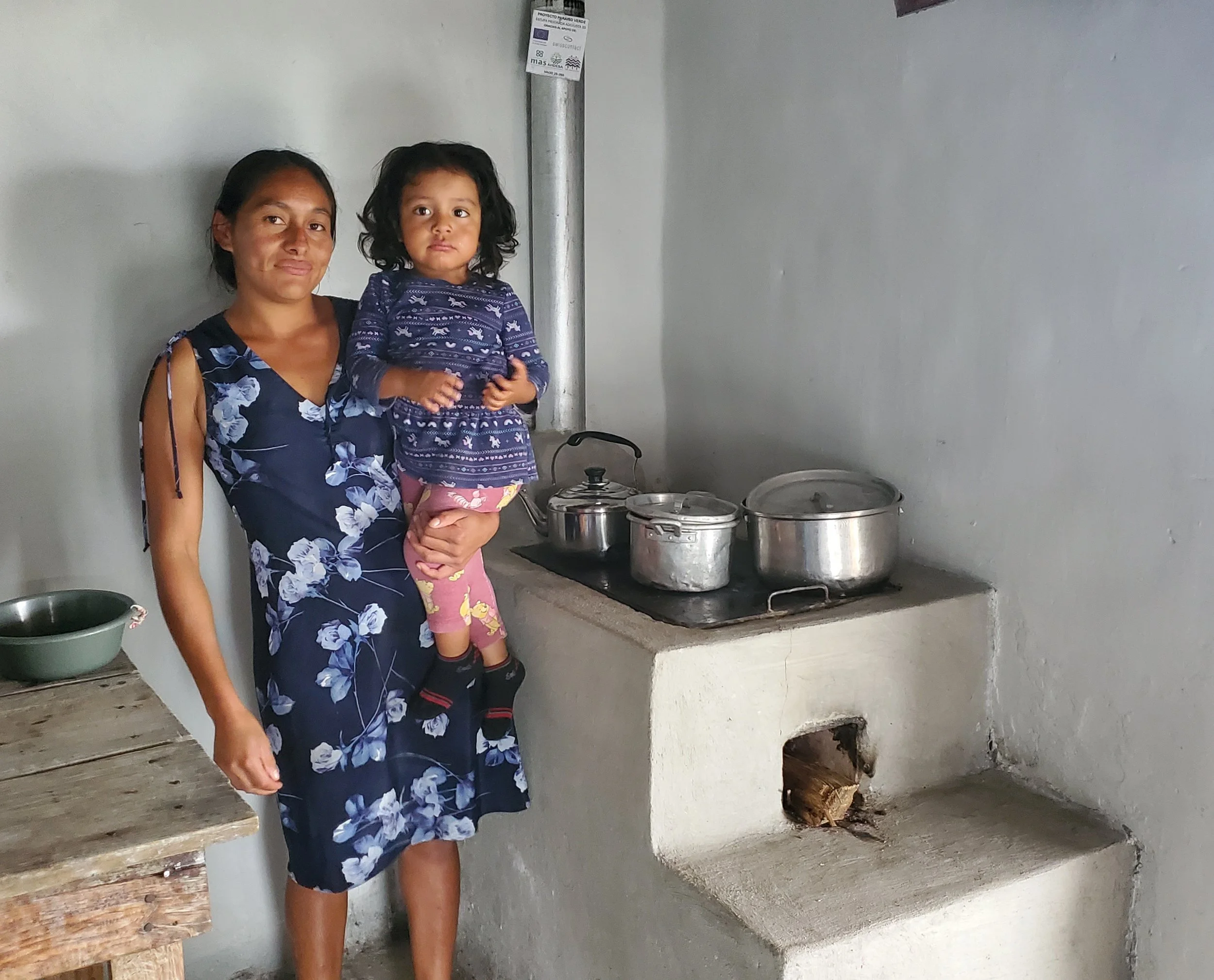
FORESTS FOREVER
Spring 2022 • Trees, Water & People Newsletter
A Note From Our Executive Director, Sebastian Africano
Spring is a time of gratitude and focus for us at Trees, Water & People. We’re bowled over daily by the generosity of our supporters, and the beginning of the year allows us to take stock of progress we made last year, challenges we’ll need to rise to in 2022, and the resources we’ve been entrusted to do our work.
Plus the days are getting noticeably longer... which I’m certainly grateful for.
If nothing else, the past two years have taught us patience and flexibility, as field work and travel plans were put on hold again and again. Like you all, we’re ready to get back to normalcy, and have already begun optimistically planning for time in the field this Spring. Our partners are also ready to get back to it - there’s work to be done!
Our Indigenous Lands Program is starting 2022 with lots of momentum. We have just finished mapping restoration areas near Cochiti Pueblo, in Capulin Canyon of the Santa Fe National Forest, and are making plans for Spring and Fall reforestation and revegetation activities there. Our team’s recent acceptance as fellows of the Center for Collaborative Conservation at Colorado State Universty will give us the space and time to study how Pueblo communities in New Mexico perceive watershed health on their ancestral lands, and will gauge the best way to get people involved in restoration.
In parallel, we’ll be expanding our work with the Ute Mountain Ute in southwest Colorado, where we’ve received grants to work on riparian restoration, including removal of invasive species, and restoration of native cottonwood galleries used for ceremonial purposes. The aridification of the southwest has been brutal on watershed health, and threatens traditional lifeways of Tribes in the four corners region.
Community members from the Aldea de Los Vecinos de Quesada (Xinca Community), conducting cleaning and pruning of tree seedlings that will be used to reforest the lands they protect.
In Guatemala we’re thrilled about the progress we’ve made with our partners via the USAID RISE Challenge, where after one year we have seen marked progress in recognizing, resisting, and reversing gender-based violence. Women in the program are organized and use gatherings and exchanges to voice their rights within family and community, as well as in the protection, access, and management of their natural resources.
In El Salvador we’re starting a 3-year project with our partner AAP, to work with 15 communities in the Chingo Volcano Conservation Area and Apaneca-Ilamatepec Biosphere Reserve. The project will feature water harvest and storage, solid waste management, Justa improved cookstoves, composting latrines, and microfinance and entrepreneurship training. We’ll also be growing 40,000 trees in AAP’s nursery, to help reforest this critical protected area.
Finally in Honduras we’re keeping momentum with our stoves program, which installed close to 2,400 stoves last year - almost double our 2020 numbers. This is our most capital intensive project on the books, as stoves cost close to $100 each to install, but the benefits to family and environmental health and the local economy are significant and well evidenced. Please reach out if you’re interested in getting more clean cookstoves into people’s homes in Honduras and beyond.
We’re so proud of the work we do, and grateful that you’re on this journey with us. Every day we consider how to create maximum impact with the funds you gift us, and make choices that put our mission and values first. Every day is a step towards a better future.
Thanks for helping us get there.
Sebastian Africano
Executive Director
Trees, Water & People
Xinca Women Reclaiming their Legacy
and their Lands in Eastern Guatemala
Written by: the Community of Quezada, Edited by Gemara Gifford, Valentina de Rooy, and Daniela Bueso
TWP and our long-term partners in Guatemala, Utz Che’, are working together with nine women’s groups to address how gender-based violence and environmental degradation are linked. Below is a story written by the women of Quezada (in the Department of Jutiapa) who continue to play a fundamental role in the protection of the community’s lands, waters, and forests. Only recently have the men in the community begun to recognize the central role women play in protecting the land. These women are continuing the legacy of their Xinca ancestors, notably by protecting their communal forest from fires, and maintaining a biodiverse and bountiful tree nursery.
Protecting Quezada’s Territory and Natural Resources
Our community is named Quezada, a historical communal organization that was established in 1859 with 156 people that self-identify as Xinca (Xinka) descendants. Our community has faced multiple threats like mining, deforestation, patriarchal violence, and agroindustries. Our main goal is to keep fighting for our territory—defend it from environmental threats and protect our communal forest for future generations! The leadership of our community to resist the extraction of natural resources and misuse of forests has given women a historical role in leadership, environmental protection, and provision of food.
Gender Equity and Women’s Rights
Recognizing women’s active role in the fight and resistance of Quezada’s territory, the men in our community governance saw an urgent need to strengthen womens’ voices and leadership through the establishment of the women’s council in 2019. The women’s efforts were reactivated in 2021 with 32 newly elected female members as part of our project. Since then, we have deepened our learning about women’s rights, struggles, and empowerment, and we have strengthened bonds within the community. Our legacy in the resistance against extractivism and territorial dispossession is no longer going unnoticed.
“One of the main challenges has been the peaceful resistance against mining. Back then, there was no women’s council, however, there were many women who participated in this resistance, and had a stronger voice within their communities, even more than the men. They have always been actively participating in this and also in caring for the environment, which is one of the factors that matter most, and women have been the main protagonists in our territory in this” — Carla Rachel

“ Trees Water and People has been an integral partner in riparian restoration on Ute Mountain Ute Tribal lands. Their support has allowed us to remove invasive tamarisk and restore cottonwood galleries that provide an important resource for traditional harvest and wildlife habitat.
Trees Water and People made this project possible through helping us build connections, and providing additional capacity and training to achieve our goals for ecological restoration.”
– Hannah Ertl
Biologist | Environmental Programs
Ute Mountain Ute Tribe
Responding to a Changing Climate
By the TWP Indigenous Lands Team
Covering the southwest corner of Colorado, Ute Mountain Ute (UMUT) tribal lands are facing the effects of a changing climate, including extreme drought. However, the community drive to ensure cultural resource availability on their lands, in perpetuity, is strong. The increasing impacts climate change has on the UMUT way of life have made apparent the need for larger watershed or landscape-scale* restoration projects. In response, Trees, Water & People’s (TWP) Indigenous Lands Program is scaling up our focus to address these big-scale challenges and support Indigenous communities.
More specifically, the Cottonwood tree is one essential resource used for ceremonial purposes for the UMUT, the trees also provide vital ecological benefits such as roots systems stabilizing streambanks, stream temperature regulation and critical wildlife habitat. The Mancos River is lined with mature Cottonwood galleries but the understory has been infested with invasive Tamarisk (Salt Cedar) and without intensive restoration work there is currently little natural regeneration, which is preventing the understory from recovering and limiting future Cottonwood availability. Many other culturally and ecologically important species are negatively impacted and in decline as a result of these invasive Tamarisk shrubs.
In partnership with the UMUT and the Mountain Studies Institute, we began planting Plains Cottonwood and Coyote Willow seedlings in combination with installing low tech rock structures for water retention after Tamarisk removal in a pilot restoration area in the Fall of 2021. While the issues surrounding invasive species and the lack of regeneration of vital native species go far beyond the small 10-acre pilot, this project gives us foundational information on what the most effective approaches will be as we seek to continue to expand the restoration area in upcoming years. Looking at our work as a part of a dynamic and changing system allows TWP to be an effective partner to Indigenous Communities seeking to protect their tribal lands and
ensure resilience in the face of global challenges.
This project is a partnership between the Ute Mountain Ute Tribe, Mountain Studies Institute and TWP and is made possible with the support of TWP donors, Catena Foundation and Wildlife Conservation Society’s Doris Duke Climate Adaptation Fund.
* Landscape-scale restoration can be loosely defined as, “the improvement of degraded land on a large scale that rebuilds ecological integrity and enhances people’s lives” (futureterrains.org). Our work with the UMUT, as with all of our partner communities, aims to work collaboratively to improve local ecology and lives.
10 Years Supporting Local Communities and the Environment
This year marks the 10th Anniversary of our partnership with online printer Smartpress and their parent organization The Bernard Group. Since 2012, as part of their comprehensive strategy and commitment to social and environmental responsibility, they have been avid supporters of our restoration efforts on lndigenous lands in the US.
Thanks to this collaboration we have been able to plant thousands of trees in Pine Ridge, South Dakota. In a region where conditions are difficult, each one of the trees planted has a great significance in the fight for a healthier habitat and the protection of biodiversity, but most importantly, is part of an effort to ensure Native voices are represented and prioritized in conservation decisions regarding their territories.
Through our decade-long relationship, Smartpress and The Bernard Group have shown their commitment to combating climate change and supporting Indigenous peoples leading conservation efforts. Sustaining partnerships like this one are vital for our work at TWP, we are grateful and excited to continue our fruitful partnership this year.
To learn more about Smartpress and their online printing services visit, smartpress.com
If you would like to learn more about how your business or organization can partner with Trees, Water & People to create meaningful impact on Indigenous Lands or Central America, please contact Hellen Castro - hellen@treeswaterpeople.org
Traveling with New Intentions
Dutch Bros. staff, carcafé staff, and a local female coffee farmer in Colombia, sharing an empowering moment, representing strong and hard working women in the coffee industry!
When the Covid-19 pandemic hit us all by surprise in 2020, TWP Tours was put on hold as we all had to rethink the way we travel. This pause gave us the opportunity to analyze our TWP Tours programs and trips, put together a new advisory board, build a new website, and develop new partnerships. Now that we are back on the road, we’ve chosen to continue to learn about regenerative travel, cultural humility, and have shifted our attention to custom tailored tours and traveling with better intentions.
What we mean by intentional trips is ensuring the health and safety of local partners, communities and tour participants, while also trying to heal ourselves and those communities that have been hit the hardest by the pandemic, climate change and a fallout in tourism. “As the pandemic lingers into its third calendar year, it’s probably not surprising that travelers are increasingly looking at their vacations to work on their mental and physical wellness” (NYT, 2021). We are keen to find those unique places we can travel to heal, learn, and be more intentional with the way we interact with locals.
Thanks to strong relationships between our donors, corporate partners, student groups and other organizations we managed to pull off some special tours in 2021. We started with an amazing pilot tour in New Mexico with Steamboat Mountain School and Human Nature Expeditions, followed by a South Dakota trip with Lansing Catholic High School, and topped it all off with a new custom coffee tour to Colombia with Dutch Bros. Coffee. Our Tours team will continue to look at our trips through a different lens and a new style, focusing our intentions on finding that magical trip that can be fulfilling, nurturing, and rejuvenating for everyone involved.












When the 110 families of El Asintal resettled in Guatemala, they arrived home to a near-empty plot of land, with scarce resources to rebuild.
Like many Indigenous communities in the region, these families were displaced amidst Guatemala’s violent civil war. The government’s designation of lands for resettlement in the early 2000s was an opportunity to return home, but not without significant debt and great hardship.